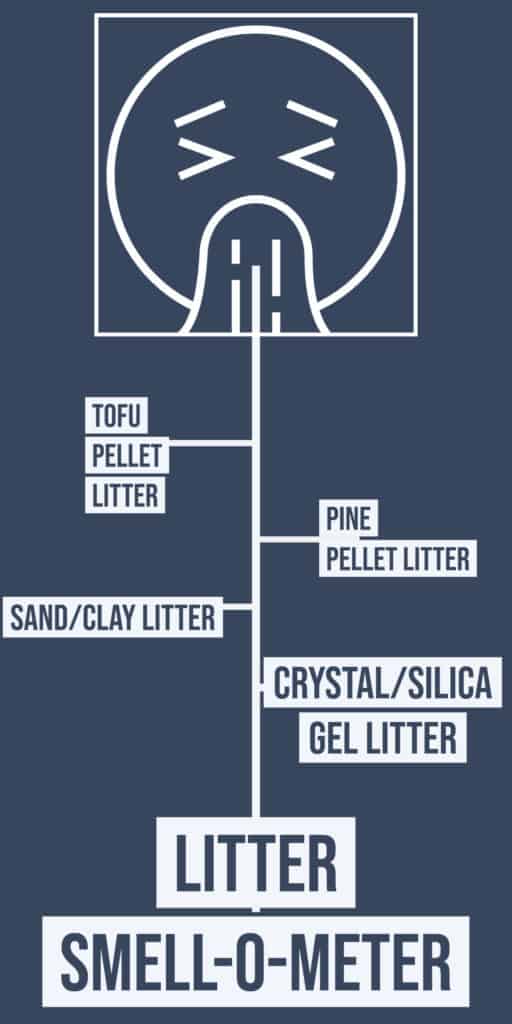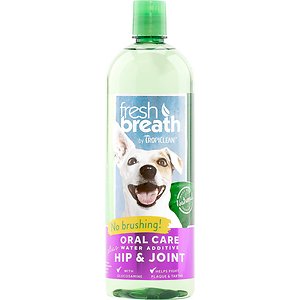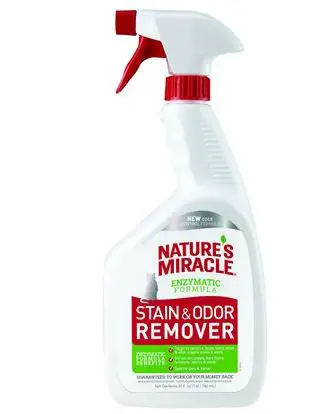How do you control the cat odor in an apartment? If you’re having trouble with the smell in your apartment, most of the bad odor doesn’t come from our cats themselves, but they come from their food, litter box, and not enough ventilation concentrating these smells. So to control the odor, you cannot just cover it up. It wat ould be best if you tackled the smell from the source.
Cats are relatively clean creatures. They groom themselves after every meal to get rid of the smell of whatever they just ate. They don’t need daily baths, and in general, they don’t really smell themselves. However, the things they use daily, combined with lack of ventilation, cause the most problems in smell and odor.

In smaller homes and spaces such as studio apartments, these smells can get concentrated and can make your apartment stink up quite a bit.
People are surprised when they step into my apartment. They expected it to smell bad with 4 cats in a small space. It even smells good! I’m not too fond of covering up the smell with artificial perfumed scents either.
What Are the Main Sources of Cat Odor in Apartments?
When we talk about “cat” odor, we think of that musky smell when we first walk into a place with cats or animals in general or maybe the stink from the litter box. Therefore, to properly tackle cat odor, it’s best to take a big picture approach.
Here’s a quick summary of how to manage cat odor:
- Odor from cats – frequent grooming and water additives
- Cat Food Odor – correctly portion foods, don’t free-feed cats, and seal the food!
- Odor from litter box – location, ventilation, and litter types are all factors that affect the smell that come from the litter box.
- Stains from accidental/intentional elmination or our cat’s bodily fluids – use enzymatic cleaners to prevent repeated behaviors!
This article will be discussing some of these odor sources and some of the solutions to minimize them because some odors we have to live with and should try to work around them when we can.
Identifying and Finding Difficult to Locate Cat Odors
If there’s a certain smell of urine or ammonia coming from somewhere, owners are unsure where it might be coming from. You might have to use a black or UV light to locate these stains accurately.
Here’s how to do that:
- Make sure the UV light is rated 365-385 nm.
- Get the room as dark as possible.
- The stain or urine spot will be neon or yellow
- Clean the stain with an enzymatic cleaner so cats aren’t tempted to elminate there again.
After confirming that your cat has a litter box avoidance problem, check my article on how to solve it here: What to Do When Your Cat Pees/Poops Outside the Litter Box!
How to Control Odor From Cats
We know that cats don’t smell themselves. I often sniff my cats (cat person things) and am always surprised by how little they smell. Cats don’t really sweat (they actually sweat from their paws), and they often groom themselves. So they don’t typically have a scent.
However, there is one piece of the odor puzzle that does come from cats. It’s their saliva. Their saliva is full of bacteria and enzymes that have quite a strong odor. It’s the cause of their cat’s breath. It’s fishy and quite strong. So as they groom their bodies, some of this saliva goes from their bodies and onto furniture or blankets.
How can we manage odor from cats? Well, help them out by grooming and brushing your cat. It gets rid of their loose fur, dead skin cells and allows their fur to breathe more easily. As a result, substantially decreases dampness and decreases odor.
Also, brushing your cat prevents fur and thus their saliva from getting onto your blankets and furniture. It’s a good idea to brush and groom your cat at least weekly!

One other thing one could try is to use some water additives (see below for the one that I use) that freshen a cat’s breath.
You add it to your cat’s water dish or water fountain, and over time, as they drink their water, it controls bacteria, plaque, and staves off bad breath.
Some dental snacks could help with this type of smell. I would recommend buying a little of everything first and see if your cat likes it, and then buy more when you see the cats reacting well to it.
How to Control Odor From Cat Food
Cat food is the next odor source, and it has quite a strong odor. Again, especially on hot summer days, the smell can really be quite stuffy. So with cat food, it’s important to not leave too much cat food out in the open.
Keep the extra food in a container with a good seal that traps the smell. The food doesn’t go stale, and the cats can’t get into it without you.
If you have been scheduling your cat’s meals, it’s easy to predict just enough food to last them until the next mealtime. It varies from cat to cat but as long as you observe and learn how much they eat. It becomes easy to portion just enough food.
The key is to give them just enough so that within about an hour or two, they finish the whole bowl of food.
I have a sealed food box in my studio apartment until I open it and scoop out of it. The cats will have a meal once in the morning after I get home from work, and at night before I go to sleep (this is incredibly important to preserve my beauty sleep) (this is incredibly important to preserve my beauty sleep).
It takes them about an hour or two to finish their food and be fine until the next mealtime. It minimizes the time for the food to be outside and stinking up the apartment!
How to Control Odor From Cat’s Litter & Litter Box

Apartment Litter Box Hacks/Tips
Depending on the litter type, there are certain things that I like to do to minimize the smells. But first, here are some general hacks for apartments and studio apartments:
- For people that use pine litter and a sifting litter box, unused or used ground coffee can be great – after a coffee in the morning, just throw the used coffee grounds at the bottom of the sifter (not ontop of the litter since it can make your cat sick or worse if they accidentally ingest it), and it’ll help absorb the ammonia smells.
- Baking soda is powerful (make a baking soda spray for easy use!) – either scented or unscented (depending on your cat’s preferences), sprinkle after scooping to once again to minimize the smells. Just mix baking soda with some water and put it in a cleaned out spray-bottle and presto! This extends the usage of the baking soda and provides an easy solution for odor suppression!
- Deep clean the litter box once a month – ammonia eats away at plastic that odor bacteria loves to get into. Dumping everything out and giving your box a deep clean will help with getting rid of those tougher, more persistent smells.
- Use vinegar/enzymatic cleaners for the deep cleaning and tougher jobs – vinegar neutralizes ammonia. That means it can completely get rid of these smells and prevent repeated occurences.
- Location matters – put in some thought about where the litter box is being kept is going to help with smells. In general, it’s a good idea to put the litter box near doors, windows, or other openings where it lets some of the smelly air out. There are other reasons to have a good location for your litter box too! Click here for my article for the most optimal places to put the litter box!
For more apartment litter box solutions and a complete solutions guide on cat litter boxes and litter, read here!
The Thing About Regular Litter Is…
Clay-based litter (sand litter) is probably one of the biggest offending odor sources if you leave it for more than a couple of days in a studio apartment. Unfortunately, It’s also the most popular and most well-known litter type for cats. If you are using sand or clumping litter, you better be prepared for the smell to kick you in the face unless you’re okay with replacing the sand in the litter box every 2-3 days.

Within a couple of days, sand litter stops clumping well and the clumps begin to break apart. As a result, the broken clumps become urine dust at the bottom of the litter box.
It’s impossible to get rid of that smell without dumping out the whole litter sand and replacing it with new sand. It’s a nightmare.
This was ridiculous to me in a multi-cat home or apartment within a couple of days of replacing my litter. It starts to smell really bad despite me scooping every day!
The odor control from the sand litter was great on the first day, but after the third or fourth day, it begins to break apart and become dust. Eventually, the smell from the dust gets to be so bad that I have to replace the litter completely (dump out everything and start with completely fresh litter) and restart that cycle again.
Not to mention it would track and spread everywhere, causing me to vacuum constantly. In my studio apartment, the litterbox is about 4 steps away from my work area. So I smell everything that goes on. Sand litter is sometimes so unbearable that I could not get any work done. It was that distracting.
This was unacceptable for me, and I had to go searching for another litter alternative.
Thankfully it didn’t take long for me to find pine litter and it solved almost all of the issues I had with sand litter. It’s incredibly efficient and great for long term odor control!
I wrote a very comprehensive article about pine litter here! Simply put, it doesn’t have the same urine ‘dust’ problem as clumping litter and separates its good litter pellets from the already soiled litter.

This allows for easy scooping and cleaning without dumping out the whole litter box every couple of days. It also has a very nice natural smell of wood that, for the most part, covers the smell of cat waste well!
I am so happy about pine litter. I think I might be singing its praises a bit too much. However, it might be warranted because it’s been saving me so much time and pain these days that it’s hard not to recommend it. So please, if you live in a small space such as a studio apartment, use pine litter and a proper sifting litter box!
Increase The Ventilation in Your Apartment to Manage Cat Odor
Now imagine all these odors begin to mix, and there’s no way to get rid of it. It’s pretty common with studio apartments because they usually lack large windows. So, as a result, it’s hard to get fresh air in.

Without a way to aerate and ventilate your apartment, all of these smells get trapped. It’s dreadful if it is hot in your apartment. As your room heats up, the hot air rises and releases the odor from your furniture. If there’s a lot of standing water around, it becomes a humid, smelly sauna.
Proper ventilation is about half of the odor prevention equation.
So before I leave for work, it’s always important for me to leave some of the window open to let some fresh air in and the stuffy air out. Or during the weekend, leaving my door open a little bit to let the outside air in.
However, there are times in which you don’t have a big enough window or just can’t for whatever reason. In situations like this, it might be a good idea to get a purifier specifically for pets.
Any air purifier with Activated Carbon filters will help absorb cat smells or any other pet smells.
Here in Korea, we have an air purifier built into the air conditioning unit. So I pretty much always run that whenever I’m not home.
Recommended Apartment Cat Odor Management Products
These are the products I would recommend to help with these odors! I curate these products myself and only choose what I have used for a long time.
-
 Check Price!
Check Price!TropiClean Fresh Breath Water Additive + Plus Hip & Joint Dog & Cat Supplement is specifically designed to promote wellness for pets. Glucosamine is widely known for its active role in the repair and development of damaged or lost cartilage. Fresh Breath +Plus is uniquely designed to clean teeth, freshen breath for 12 hours, and promote complete pet wellness. Daily oral hygiene is essential to pet health. Without it, 70% of dogs and cats will start showing signs of periodontal disease by age three. When left untreated, oral disease can lead to serious health problems affecting the heart, lungs, kidney and other major organs. By simply adding Fresh Breath +Plus to your pet's water daily, you can help fight this vicious cycle.
We earn a commission if you click this link and make a purchase at no additional cost to you.
-
 Check Price!
Check Price!This air purifier is great for not only particles in the air but there is a carbon filter for smells and a UV light to help kill airborne germs and viruses. It also an antimicrobial agent that inhibits the growth of mold, mildew, and other odor-causing bacteria on the filter's surface.
We earn a commission if you click this link and make a purchase at no additional cost to you.
-
 Check Price (US) Check Price (CA)
Check Price (US) Check Price (CA)When you need that extra odor prevention, sprinkle a little into the sifting tray. Very useful when you need to get rid of odors quickly (like when guests come over).
We earn a commission if you click this link and make a purchase at no additional cost to you.
-
 Check Price (US) Check Price (CA)
Check Price (US) Check Price (CA)Nature's Miracle Just for Cats Stain and Odor Remover Spray is tough on cat urine, feces, vomit, drool, and other organic stains and odors. The bacteria-based formula produces enzymes to target spot stains and odors while freshening with a light citrus scent. When used as directed, it's safe to use on carpets, hard floors, furniture, fabrics, and more—because curious cats can get into just about anything. Plus, the ready-to-use spray bottle helps you get to work right away.
We earn a commission if you click this link and make a purchase at no additional cost to you.
Final Thoughts
When I get home from work, I don’t want to be hit in the face by funk. So it’s imperative for me always to manage these things!
These are some of the steps I take to keep my apartment fresh and smelling like a field of sunflowers. Or something like that. I hope it helped, and let me know if there are any tips or advice you might have for managing pet smells!

Let me know if you have any other tips for controlling pet odor! Or if you have any questions!
was really helpful article. thank you!
Really helpful thank you!!
Since you mentioned saliva odor- I’m curious, do you brush your cats’ teeth? I always hear that you should (some even say once a day! Who has time to do that!) but how necessary is it? Would dental snacks or chewing toys like matatabi sticks be a good replacement for brushing? Thanks!
That’s something I’ve wrestled with myself for a while. Cats eating wet food regularly will likely need more brushing than cats eating dry food (because dry food + dental foods scrape their teeth as they eat it – so it has less plaque build-up).
I think the combination with dental snacks + matatabi sticks is great for maintaining it but every so often – brushing their teeth is a good idea as well.
Just for 1. Inspection of their gum/teeth health
2. Getting rid of plaque in harder to reach places
It’s not something I would do on a daily basis because my cats right now primarily eat dry food but it’s more of a weekly to biweekly thing along with trimming their nails, and making sure the insides of their ears are clean. So I do the whole shabang in one session.
GREAT article … I have eight cats in an apartment and was desperately looking for ways to make sure my apartment didn’t smell like eight cats!! This has really helped. Thanks so much!